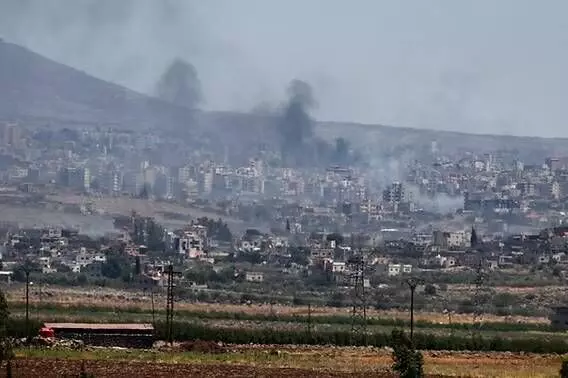Syria's Sweida Province Engulfed in Sectarian Conflict: Over 900 Dead as Ceasefire Efforts Falter
Sectarian violence in Syria's Sweida province escalates with over 900 dead. Learn about the Druze-Bedouin clashes, ceasefire attempts, and international reactions in this deepening crisis.
Syria's Sweida Province Engulfed in Sectarian Conflict: Over 900 Dead as Ceasefire Efforts Falter

SWEIDA, Syria – A humanitarian crisis is unfolding in Syria's southern Sweida province, where fierce sectarian clashes between the Druze community and Bedouin tribes have claimed at least 940 lives in the past week alone. Despite an announced ceasefire and the deployment of government security forces, violence continued to rage on Saturday, marked by persistent mortar blasts and machinegun fire across villages and within Sweida city.
The escalating conflict, which has drawn in government forces clashing with Druze gunmen, represents the most significant challenge yet to the Islamist-dominated interim government led by President Ahmed al-Sharaa, who assumed power after Bashar al-Assad's overthrow in December.
Witnesses reported intense gunfire in Sweida city and shellfire hitting nearby areas throughout Saturday. While authorities have not confirmed new casualties from the latest violence, the UK-based Syrian Observatory for Human Rights (SOHR) has reported the grim death toll of 940 from the ongoing battles, a figure that remains unverified by independent sources.
Fragile Peace Efforts and International Involvement
Interim President Ahmed al-Sharaa acknowledged "Arab and American" efforts for a temporary de-escalation earlier in the week before the renewed surge in violence. In a televised address on Saturday, Sharaa declared an "immediate ceasefire," urging all sides to halt hostilities and stating, "Syria would not be a testing ground for partition, secession, or sectarian incitement." He also condemned recent Israeli airstrikes, attributing them to pushing the country into "a dangerous phase that threatened its stability," and accused Druze militants of carrying out revenge attacks on Bedouin groups.
The deepening crisis has also prompted direct military intervention from Israel, which conducted airstrikes in southern Syria and on the defense ministry in Damascus this week. Israeli officials assert their actions are aimed at defending the Druze, a significant minority group also present in Israel.
However, a notable policy divide exists between Israel and the U.S. on Syria. While Washington supports Sharaa's government as a unifying force, Israel warns that the current leadership is dominated by extremist elements and poses a threat to minority communities. This concern is amplified by previous accusations in March that Syria’s military under the new leadership carried out mass killings targeting the Alawite community, formerly Assad's power base.
U.S. envoy Tom Barrack, serving as both Ambassador to Turkey and Washington’s Syria envoy, announced a ceasefire agreement between Syria and Israel, urging all communities – Druze, Bedouin, Sunni, and others – to "build a new and united Syrian identity." Despite this diplomatic outreach, Israeli airstrikes have continued to target Syrian military installations over the past seven months.
Civilian Toll Mounts as Hospitals Overwhelmed
The human cost of the renewed violence is severe. Residents like Mansour Namour, living near Sweida city, reported continuous mortar fire close to his village, stating, "At least 22 people had been wounded."
Hospitals within Sweida city are struggling to cope with the influx of casualties. Omar Obeid, director of a local hospital, described chaotic scenes and overflowing wards. "All the injuries are from bombs, some people with their chests wounded. There are also injuries to limbs from shrapnel," Obeid stated, highlighting the brutal nature of the conflict.
As Sweida reels from the week-long violence, the effectiveness of the ceasefire remains precarious, with fears that further sectarian bloodshed could plunge the country deeper into instability and exacerbate the already dire humanitarian situation.

